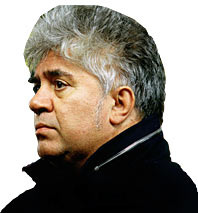
Volver is a movie about reunions, between a spectral mother and her daughters and between Pedro Almodóvar and his own past. He shot much of the film in La Mancha, Spain, where he grew up, and he cast Carmen Maura, whom he had not worked with since a very public falling out. Logan Hill spoke with Almodóvar about his mom, the Inferno, and Penélope Cruz’s posterior.
Was filming in La Mancha bittersweet?
It was a completely unique experience. My mother was not physically present, but she was present in every sequence. I feel in this movie everything was blessed.
More so than in other films?
Some movies, you get the Inferno. And sometimes you fight so the movie will still turn out great. I heard that Faye Dunaway and Warren Beatty had an awful relationship, but you see Bonnie and Clyde? They are marvelous, they have an incredible chemistry.
Was Bad Education the Inferno?
Yes, and part of Live Flesh. With me, it’s usually movies about men. With Bad Education, we almost couldn’t finish. I didn’t want to continue, because it’s like bleeding.
Was the main problem the relationship between you and Gael García Bernal?
The problem was that he became so upset that he couldn’t shoot. And that was because of the role [a transvestite], so that was very complicated. I suppose he suffered a lot—I think I suffered more anyway.
And what was it like working with Carmen Maura after eighteen years?
It was exactly the same. Penélope [Cruz] was getting to that level that Carmen had already [attained] in the past. With the two of them, I could go as far as I wanted. I feel like I became a director just to direct actors. Because you are their first witness, and you can say, “I was the first one to see that.” It’s an incredible feeling. And I am addicted to that.
Carmen Maura has said that you seem darker now.
It is true that my films have been leaning increasingly toward something that has much more to do with emotions. The eighties were such an explosive moment for me. I now live a much more internal life. My next story is about revenge: something very, very dark.
As for Penélope, I have to ask about her prosthetic butt. You’ve said it’s an “optimistic ass”?
Here everyone asks about her butt! Why? But, yes, I think of the big butt as a mark of optimism. That butt is what you aspire to have as a child. And for me, a mother was someone who was very generous at the bottom as well as at the top. Nature has been very generous with Penélope as far as the top goes, but … well, that’s why we used the big butt.
SEE ALSO
All About My Dead Mother
David Edelstein’s review